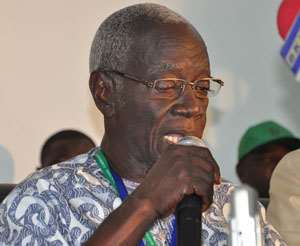
Not even the recent launching of a publication on electoral laws could assuage the concerns of Ghanaians about the quality of election management and the unwholesome state of the electoral register.
Concerned Ghanaians—and they constitute a critical chunk of the voting population—who are not enthused about the standards of election management and the state of the voters' register, appear to be saying in response to the publication rather cynically: 'that is not what would treat the gangrenous electoral register.'
We could not agree more to their stance because what we have currently as election parameters have outlived their usefulness and are only sources of avoidable friction and strife for future polls. They facilitate the manipulation of figures to the advantage of the ruling party at elections. We address them now and reduce election day tension and possible strife, or harbour them according to the dictates of Kwadwo Afari-Gyan and live to regret it in the not-too-distant future.
When the ruling party disagrees with those who hold the view that an efficient auditing of the electoral register among other changes is necessary for credible polls, they do not surprise us. After all, it is in their interest that the status quo is maintained.
Civil society organisations have put forth countless reasons why the status quo cannot engender peace and tranquillity during and after elections. Indeed, but for the good nature of the average Ghanaian, the last polls could have degenerated into an untoward scene.
We cannot vouch for the continued prevalence of peace during the important democratic exercise when, as it were, the Electoral Commission, with Afari-Gyan at the helm, claims to be all-knowing. As a dynamic process, election management should periodically go through changes.
The various changes which have taken place over the years from the days of opaque ballot boxes and non-photo voter ID cards are evidences of the growth of the process at the instance of the main opposition party and civil society organisations.
Any attempt at ignoring the various demands for electoral reforms as endorsed, as it were, during the vexatious election petition hearing at the Supreme Court, would be courting trouble.
Dr Kwadwo Afari-Gyan, who a few years ago called for assistance in cleaning up the voter register which, as he noted, was riddled with unqualified persons, could not have rescinded his opinion with no tangible reasons overnight.
The independence of an electoral commission does not mean shunning the sensible demands of those whose taxes are used to maintain it and in whose interest it works.
The contributions of the political parties and civil society organisations are enough to ensure an election machine largely immune from the manipulation of the ruling party and their cohorts.




 This IMANI job no dey pap; the people you are fighting for are always fighting y...
This IMANI job no dey pap; the people you are fighting for are always fighting y...
 Prof. Naana Opoku-Agyemang has changed; you can see a certain sense of urgency –...
Prof. Naana Opoku-Agyemang has changed; you can see a certain sense of urgency –...
 MFWA Executive Director slams Akoma FM for engaging in ‘irresponsible’ media pra...
MFWA Executive Director slams Akoma FM for engaging in ‘irresponsible’ media pra...
 ‘Women must become millionaires too’ — Prof Jane Naana on establishment of Women...
‘Women must become millionaires too’ — Prof Jane Naana on establishment of Women...
 Some believe only in Ghanaian votes, not Ghana — Kofi Asare jabs politicians
Some believe only in Ghanaian votes, not Ghana — Kofi Asare jabs politicians
 Plan to make BEST sole aggregator of Sentuo Oil Refinery will create market chal...
Plan to make BEST sole aggregator of Sentuo Oil Refinery will create market chal...
 2024 elections: I can't have the man I removed from office as my successor — Aku...
2024 elections: I can't have the man I removed from office as my successor — Aku...
 2024 Elections: Immediate-past NPP Germany Branch Chairman garners massive votes...
2024 Elections: Immediate-past NPP Germany Branch Chairman garners massive votes...
 Gov’t focused on making Ghana energy self-sufficient, eco-friendly – Akufo-Addo
Gov’t focused on making Ghana energy self-sufficient, eco-friendly – Akufo-Addo
 April 25: Cedi sells at GHS13.74 to $1, GHS13.14 on BoG interbank
April 25: Cedi sells at GHS13.74 to $1, GHS13.14 on BoG interbank
